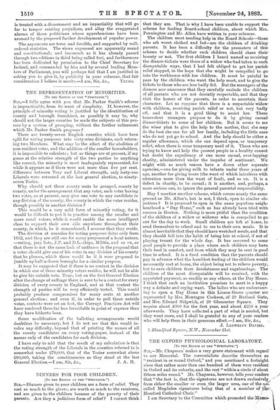THE REPRESENTATION OF MINORITIES.
(To THE ED/TOR OF THE " SPECTATOR:1
fully agree with you that Mr. Parker Smith's scheme is impracticable, from its want of simplicity. If, however, the principle of minority voting is justified by the identification of county and borough franchises, as possibly it may be, why should not the larger counties be made the subjects of this pro- cess by a system of grouping, without the further refinement -which Mr. Parker Smith proposes P There are twenty-seven English counties which have been split for voting purposes into sixty-nine divisions, each return- ing two Members. What may be the effect of the abolition of non-resident votes, and the addition of the smaller householders, it is impossible to calculate; but as things are at present, if my guess at the relative strength of the two parties be anything like correct, the minority is most inadequately represented, for while it appears as if there were not more than five per cent. difference between Tory and Liberal strength, only forty-one Liberals were returned at the last general election, to ninety- seven Tories.
Why should not these county seats be grouped, county by county, under the arrangement that any voter, each voter having two votes, as at present, may give one vote to any candidate in any division of the county, the county in which the voter resides, though possibly in another division ?
This would be a very mild form of minority voting, for it would be difficult to put it in practice among the smaller and more rural voters, while it would enable the more intelligent class to support their own side anywhere throughout their county, in which, be it remembered, I assume that they reside. The division of counties for voting purposes' dates only from 1832, and they are still one for many purposes of a local nature, —rating, jury lists, J.P. and .D.L.-ships, Militia, and so en, so that there is not the same look of unfitness in the proposal that a voter should give one of his votes in any division of his county that he pleases, which there would be if, it were proposed to jumble up half-a-dozen boroughs for a similar purpose.
it may be suggested that if there is no contest in the division in which one of these minority voters resides, he will not be able to give his outside vote. True ; but on the first General Election after the change of suffrage there is sure to be a contest for every division of every county in England, and at that contest the strength of parties will be very efficiently tested. This would probably produce compromises for many seats at another 'general election ; and even if, in order to poll these outside votes, contests were set on foot, the Corrupt Practices Act will have rendered them far less formidable in point of expense than they have hitherto been.
Some modification of the balloting arrangements would doubtless be necessary, but I do not see that this would in- volve any difficulty, beyond that of printing the names of all the county candidates on every voting-paper, instead of the names only of the candidates for each division.
I have only to add that the result of my calculation is that the voting strength of the Liberals in the counties referred to is somewhat under 270,000, that of the Tories somewhat above 280,000, taking the constituencies as they stood at the last General Election.—I am, Sir, &c., J. A. H.






































 Previous page
Previous page